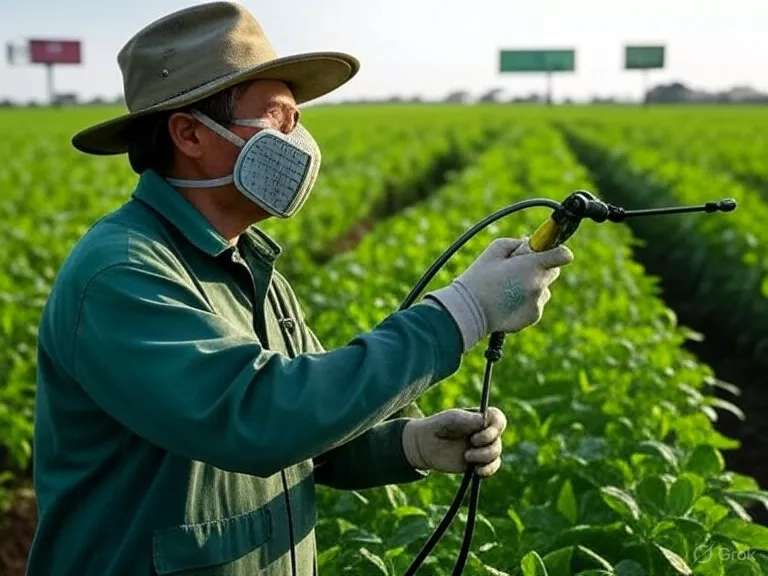Description
Agrochemicals are chemicals used in agriculture to improve crop yields and protect crops from pests. They can be used to kill weeds, insects, and fungi that damage crops, or to control plant growth and fertility. Agrochemicals are an important part of modern agriculture, and are essential for producing food for a growing population.
There are a variety of agrochemicals available, and they can be divided into four main groups: herbicides, insecticides, fungicides, and plant growth regulators. Herbicides are used to kill weeds, and are the most common type of agrochemical used. Insecticides are used to kill insects that damage crops, and are also very common. Fungicides are used to control fungi that damage crops, and are less common than herbicides and insecticides. Plant growth regulators are used to control plant growth and fertility, and are the least common type of agrochemical.
Agrochemicals are applied to crops in a variety of ways, including spraying, soil application, and seed treatment.
Benefits
Agrochemicals are chemical products used in agricultural production to increase crop yields, improve crop quality, and reduce crop losses due to pests, diseases, and weeds. They can also be used to improve soil fertility and water quality.
Benefits of agrochemicals include:
1. Increased crop yields: Agrochemicals can help increase crop yields by providing essential nutrients to the soil and controlling pests and weeds. This can help farmers maximize their profits and reduce their losses.
2. Improved crop quality: Agrochemicals can help improve crop quality by providing essential nutrients to the soil and controlling pests and weeds. This can help farmers produce higher quality crops that are more marketable.
3. Reduced crop losses: Agrochemicals can help reduce crop losses due to pests, diseases, and weeds. This can help farmers save money and reduce their losses.
4. Improved soil fertility: Agrochemicals can help improve soil fertility by providing essential nutrients to the soil. This can help farmers produce higher quality crops and increase their yields.
5. Improved water quality: Agrochemicals can help improve water quality by controlling pests and weeds. This can help reduce water pollution and improve the health of aquatic ecosystems.
6. Reduced environmental impact: Agrochemicals can help reduce the environmental impact of agricultural production by reducing the use of pesticides and other chemicals. This can help protect the environment and reduce the risk of health problems associated with chemical exposure.
Tips
1. Always read and follow the label instructions when using agrochemicals. This includes wearing the appropriate protective clothing and equipment.
2. Store agrochemicals in a secure, dry, and cool place away from children, pets, and food.
3. Avoid mixing agrochemicals together as this can create a hazardous reaction.
4. When applying agrochemicals, use the right amount and avoid over-application.
5. Use the right equipment for the job, such as a sprayer or spreader.
6. Wear protective clothing and equipment when handling agrochemicals, such as gloves, goggles, and a face mask.
7. Avoid contact with skin, eyes, and mouth when handling agrochemicals.
8. Wash hands and any exposed skin after handling agrochemicals.
9. Dispose of agrochemicals safely and in accordance with local regulations.
10. Avoid using agrochemicals near water sources, such as rivers, streams, and ponds.
11. Avoid using agrochemicals near sensitive areas, such as schools, hospitals, and residential areas.
12. Monitor the environment for signs of agrochemical contamination.
13. Educate yourself on the potential risks associated with agrochemicals.
14. Be aware of the potential impacts of agrochemicals on human health and the environment.
15. Consider using alternative methods of pest control, such as biological control or integrated pest management.
16. If you have any questions or concerns about agrochemicals, contact your local extension office or agricultural department.
Questions
Q1: What are agrochemicals?
A1: Agrochemicals are chemical products used in agriculture to enhance crop production and protect crops from pests, weeds, and diseases. They include fertilizers, herbicides, insecticides, fungicides, and other products.
Q2: How do agrochemicals work?
A2: Agrochemicals work by providing essential nutrients to crops, controlling weeds, and killing or repelling pests. Fertilizers provide essential nutrients to crops, while herbicides, insecticides, and fungicides control weeds, insects, and fungi, respectively.
Q3: Are agrochemicals safe?
A3: Agrochemicals can be safe when used properly. However, improper use can lead to environmental contamination and health risks. It is important to follow the instructions on the label and use protective equipment when handling agrochemicals.
Q4: What are the benefits of using agrochemicals?
A4: Agrochemicals can help increase crop yields, reduce crop losses due to pests and diseases, and improve soil fertility. They can also reduce the need for manual labor and help farmers save time and money.
Q5: What are the risks of using agrochemicals?
A5: The risks of using agrochemicals include environmental contamination, health risks, and resistance to the chemicals. Improper use of agrochemicals can lead to contamination of soil, water, and air, as well as health risks to humans and animals. Additionally, pests and weeds can develop resistance to the chemicals, making them less effective.
Conclusion
Agrochemicals have been a major part of modern agriculture since the mid-20th century. They have enabled farmers to increase crop yields, reduce labor costs, and improve the quality of their crops. However, the use of agrochemicals has also been linked to a number of environmental and health concerns. These include soil and water contamination, air pollution, and the potential for long-term health effects. As a result, it is important for farmers to use agrochemicals responsibly and to take steps to minimize their environmental and health impacts. This includes using integrated pest management strategies, such as crop rotation and biological control, to reduce the need for agrochemicals. It also includes using the least toxic agrochemicals available and following label instructions to ensure proper application. By taking these steps, farmers can help to ensure that agrochemicals are used safely and effectively.
